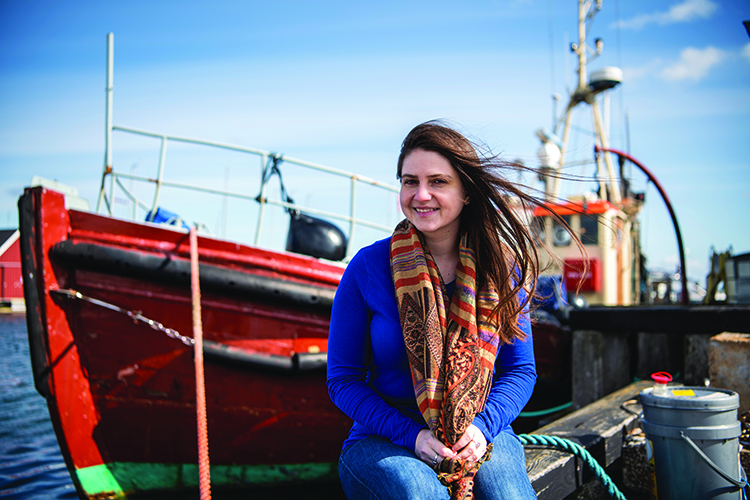Christine Hebert’s digital marketplace disrupts a predatory seafood supply chain.
During family vacations in Maine, Christine Hebert ’12 accompanied her father to the docks to buy lobster straight from the fishermen. She’d play with the blue lobster they kept as a pet. When she moved from the United States to Copenhagen, Denmark, to pursue a master’s degree, Hebert was looking forward to buying lobster off the docks, but she was disappointed to find that she was unable to buy fresh seafood from the fishermen — or from the grocery store. Although Copenhagen is right on the Baltic Sea, its supermarkets offered only a small selection of prepackaged frozen fish for exorbitant prices.
Hebert, who was studying environmental and natural resource economics at the University of Copenhagen, tracked down the reason why: Denmark’s convoluted supply chain exploits fishermen, gouges customers, and thrives on intimidation. There, Hebert saw an opportunity.
Hebert enjoys “looking at the world in terms of data and throwing in some doing good for the world.” She and her friend Nima Tisdall, a business student from Copenhagen, conceived of a digital marketplace app through which small-scale fishermen could bypass the supply chain to sell directly to buyers. In just three and a half years, their company, Blue Lobster, has expanded throughout Denmark — but it started with two people who knew nothing about fish.
In 2018, Hebert and Tisdall began visiting harbors, where fishermen explained that seafood from harbors throughout Copenhagen is sold at auction, passing through at least six middlemen on its way to restaurants and grocery stores. That’s why supermarket fish is at least a week old when it hits the shelf. This cycle isn’t only bad for consumers; the fishermen are paid so little that many small Danish harbors are closing, leaving the industry to bigger ships that engage in trawling, a fishing practice that devastates the oceans — and not just in Cophenhagen. Hebert and Tisdall learned that “the fishing industry in general is problematic; Denmark is really no different than supply chains in other areas.”
When Hebert and Tisdall approached the fishermen with a solution, “they thought we were crazy,” Hebert says.
The partners needed to prove their small start-up could have a big impact. They strained their limited operations purchasing one fishermen’s catch for a full week, and had more than a ton of fish pass through the company. Their risk paid off. Nearly 60 fishermen joined the company, and Blue Lobster was off and running (swimming).
Through the app, fishermen claim and fulfill orders, in addition to uploading their catches for customers to purchase directly. Blue Lobster matches the auction prices and returns the margin to the fishermen, amounting to two to four times more than they’re paid through the supply chain.
There was pushback, of course. The auctions and other buyers blacklisted
the fishermen, and “every time we went to a new harbor, our fish would get stolen,” Hebert says. “One morning, we came to pick up the boxes, and they’d been smashed.”
Hebert and Tisdall were not dissuaded; in fact, Hebert took their competitors’ animosity as a sign of Blue Lobster’s success. “There wasn’t much they could do,” she says. “They couldn’t compete with how much we were paying.”
The company began to garner notice beyond Copenhagen, with a mention in the Financial Times and a Nordic Ocean Watch headline naming the duo “Ocean Heroes.”
Then, the COVID-19 pandemic hit, and in the midst of Denmark’s lockdown, restaurants closed. Hebert and Tisdall pivoted. They narrowed their focus to six fishermen and four harbors in Copenhagen and began selling to private consumers, which inspired them to add an education feature to the app that includes webinars with local chefs.
“Many people don’t know what the fish looks like; they just know it as the fillet they get in the grocery store,” Hebert says. “It’s important to know where your food comes from and not to be desensitized to it.”
The company now partners with more than 58 suppliers (fishermen and shellfish and seaweed providers) and 200 restaurants. They serve more than 4,100 private customers — and Hebert and Tisdall aim to take the company international. Despite their global goals, Hebert says the company’s mission remains close to home: to deliver quality seafood straight from the harbor and pay the fishermen fairly. In return, “the fishermen have really stuck with us,” Hebert says. “They feel like we’re working together to change the system.”

